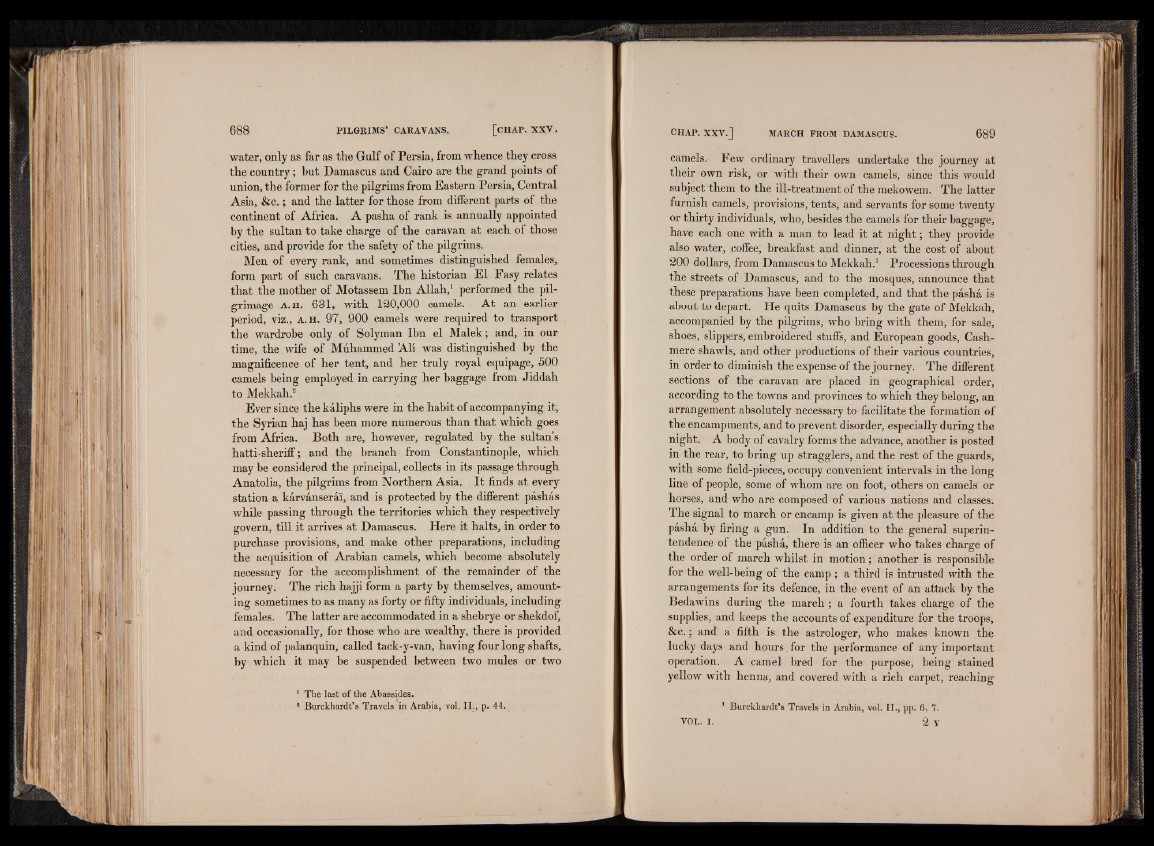
water, only as far as the Gulf of Persia, from whence they cross
the country; hut Damascus and Cairo are the grand points of
union, the former for the pilgrims from Eastern Persia, Central
Asia, &c.; and the latter for those from different parts of the
continent of Africa. A pasha of rank is annually appointed
by the sultan to take charge of the caravan at each of those
cities, and provide for the safety of the pilgrims.
Men of every rank, and sometimes distinguished females,,
form part of such caravans. The historian El Fasy relates
that the mother of Motassem Ibn Allah,^ performed the pilgrimage
A. h . 631, with 120,000 camels. At an earlier
period, viz., A.H. 97, 900 camels were required to transport
the wardrobe only of Solyman Ibn el Malek; and, in our
time, the wife of Múhammed Ali was distinguished by the
magnificence of her tent, and her truly royal equipage, 500
camels being employed in carrying her baggage from Jiddah
to Mekkah.2
Ever since the káliphs were in the habit of accompanying it,
the Syrian haj has been more numerous than that which goes
from Africa. Both are, however, regulated by the sultan’s
hatti-sheriff; and the branch from Constantinople, which
may be considered the principal, collects in its passage through
Anatolia, the pilgrims from Northern Asia. It finds at every
station a kárvánserai, and is protected by the different páshás
while passing through the territories which they respectively
govern, till it arrives at Damascus. Here it halts, in order to
purchase provisions, and make other preparations, including
the acquisition of Arabian camels, which become absolutely
necessary for the accomplishment of the remainder of the
journey. The rich hajji form a party by themselves, amounting
sometimes to as many as forty or fifty individuals, including
females. The latter are accommodated in a shebrye or shekdof,
and occasionally, for those who are wealthy, there is provided
a kind of palanquin, called tack-y-van, having four long shafts,
by which it may be suspended between two mules or . two
camels. Few ordinary travellers undertake the journey at
their own risk, or with their own camels, since this would
subject them to the ill-treatment of the mekowem. The latter
furnish camels, provisions, tents, and servants for some twenty
or thirty individuals, who, besides the camels for their baggage,
have each one with a man to lead it at night; they provide
also water, coffee, breakfast and dinner, at the cost of about
200 dollars, from Damascus to Mekkah.1 Processions through
the streets of Damascus, and to the mosques, announce that
these preparations have been completed, and that the pasha is
about to depart. He quits Damascus by the gate of Mekkah,
accompanied by the pilgrims, who bring with them, for sale,
shoes, slippers, embroidered stuffs, and European goods, Cash-
mere shawls, and other productions of their various countries,
in order to diminish the expense of the journey. The different
sections of the caravan are placed in geographical order,
according to the towns and provinces to which they belong, an
arrangement absolutely necessary to facilitate the formation of
the encampments, and to prevent disorder, especially during the
night. A body of cavalry forms the advance, another is posted
in the rear, to bring up stragglers, and the rest of the guards,
with some field-pieces, occupy convenient intervals in the long
line of people, some of whom are on foot, others on camels or
horses, and who are composed of various nations and classes.
The signal to march or encamp is given at the pleasure of the
pasha by firing a gun. In addition to the general superintendence
of the pasha, there is an officer who takes charge of
the order of march whilst in motion; another is responsible
for the well-being of the camp ; a third is intrusted with the
arrangements for its defence, in the event of an attack by the
Bedawins during the march ; a fourth takes charge of the
supplies, and keeps the accounts of expenditure for the troops,
&c.; and a fifth is the astrologer, who makes known the
lucky days and hours,for the performance of any important
operation. A camel bred for the purpose, being stained
yellow with henna, and covered with a rich carpet, reaching